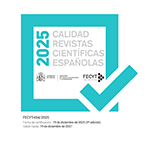Psicobiología del aprendizaje y la memoria
Abstract
Learning and memory are two processes closely related which produce adaptative changes in organisms behaviour. When we learn something we can use at least two types of cognitive strategies: one of them produces implicit memory, which is a more rigid and unconscious one, that does not easily expresses itself outside the original situation. It is a habits’ memory which is located in the same region as the motor and sensorial information’ s brain areas, mainly neocortex and basal ganglia The other cognitive strategy origins the explicit or declarative memory, a conscious and flexible memory which can express itself in various and diverse situations and context, different from the original situation. It is a memory of relational character, dependent from a brain zone known as hypo camp system, based on information stored in cortex and in other brain regions. A particular type of explicit memory in the so-called work memory, necessary for reasoning and other cognitive tasks. Work memory depends upon prefrontal cortex, a brain area implicated in time processes and sintaxis (coherent composition) of memory episodes. Oblivion could be attributed to alteration of neuronal circuits that store the information or to active processes that make difficult the consolidation or prevent the expression of memories.Downloads
Article download
License
In order to support the global exchange of knowledge, the journal CIC. Cuadernos de Información y Comunicación is allowing unrestricted access to its content as from its publication in this electronic edition, and as such it is an open-access journal. The originals published in this journal are the property of the Complutense University of Madrid and any reproduction thereof in full or in part must cite the source. All content is distributed under a Creative Commons Attribution 4.0 use and distribution licence (CC BY 4.0). This circumstance must be expressly stated in these terms where necessary. You can view the summary and the complete legal text of the licence.










